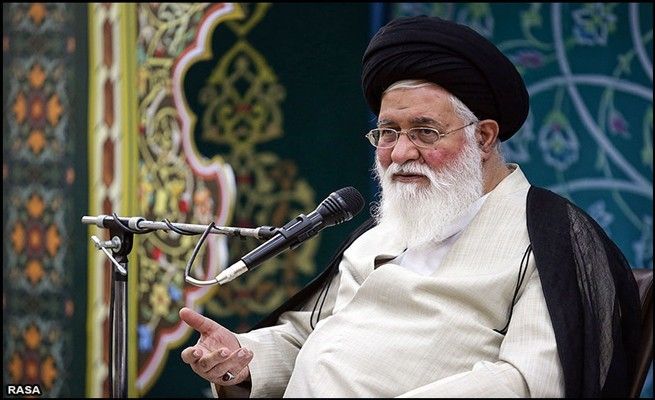March 18, 2018
By Minou Yeganeh
Senior clerics in Iran have finally realized that, after 38 years, the public is tired of hearing the same old speeches, uninspiring sermons, and empty promises. To captivate their congregation, they instead speak about beautiful actresses and provocative outfits. They also reminisce about their youth and bygone eras.

During his weekly sermon, Ayatollah Ahmad Alamolhoda, the Friday Prayer leader of Mashhad, spoke about the 1960s Italian actress Sophia Loren and a dance performance by young girls he had seen at Tehran City Hall when he was a young man.

Ayatollah Ahmad Jannati, the 92-year-old chairman of the Assembly of Experts, has also spoken about his youth and miniskirts. It is safe to assume that as a young man, Mr. Jannati, who is from the Caspian Sea region, must have seen young girls sunbathing on the beach in their bikinis.
“Before the revolution, girls with their miniskirts led our young men astray. We have to protect our youths against moral corruption,” Jannati said in a speech on March 13.
An internet user posted a comment online in response to Jannati’s remark which read: “If the chairman of the Assembly of Experts and his fellow peers truly wish to know the views of the Iranian people, particularly the young generation, on miniskirts, they should hold a referendum on the issue. But first, they must promise that voters will not be intimidated, arrested, jailed or tortured.”
Contrary to public belief, sources of emulations and clerics have never been against extramarital sex. That is why Siqeh (temporary marriage) is very common in Iran, particularly in religious cities such as Qom (home to the largest seminary in Iran.)
Former president Akbar Hashemi Rafsanjani even said that it was not necessary for a cleric to perform Siqeh in Arabic. “A man can Siqeh a woman by reading the relevant verse in Farsi,” Rafsanjani explained.
The moral corruption that Ayatollah Jannati warns about is not a new phenomenon. It has existed for decades in Iran, and including in the vicinity of the prestigious Qom Seminary.
A few years ago, an Iranian journalist, Camelia Entekhabifard, filed a report from the old cemetery in Qom on women who offered Siqeh services for money. “Men can Siqeh one of these women on an hourly, daily or monthly basis,” Entekhabifard said.
“With the help of a seminarian who worked as a go-between, we tried to interview one of the women,” she explained. “We found someone who was willing to speak to us on the condition of anonymity. The woman told us that her husband who was a truck driver had died in an accident. She was, therefore, forced into this line of work to support herself and her three children.”
In Iran, independent contractors, day workers, and freelancers don’t have a pension or employment insurance. When a breadwinner with no permanent contract dies, his wife has to find a way to support her family. “Some of the women you see in this cemetery are like me, others are drug addicts,” the woman told Entekhabifard.
Ayatollah Jannati also spoke about the recent wave of protests against the compulsory hijab. He said: “There are those who are trying to change the hijab law. Some girls have been trying to undermine the hijab through their actions.”
Jannati added: “If the young martyrs of the eight-year Iran-Iraq war were alive today and saw what was happening, they would have wished that they were dead!”
“We’ve already seen a significant drop in the number of university students who pray three times a day,” he said. “And now we’ve discovered the same trend among high school students. We must hold the government accountable for this alarming development.”
Friday Prayer leaders around the country are expected to highlight the concept of Velayat-e Faqih (Governance of the Jurist), which they believe to be divinely ordained, in their weekly sermons. They glorify the unique spiritual bonds between Valiye Faqih (Ayatollah Khamenei) and the 12th Shia Imam, Mohammad al-Mahdi. In contrast, they blame President Hassan Rouhani and his cabinet for the failure of the education system, civil unrest, unemployment, economic crisis, corruption, homelessness, rampant addiction and widespread prostitution.
Jannati and other clerics who are the devotees of the Velayat-e Faqih don’t dare criticize Iran’s Supreme Leader Ayatollah Ali Khamenei. It is also not in their best interest to question the actions of Mr. Khamenei’s appointed officials to the Judiciary, the Guardian Council, the Expediency Council, the Assembly of Experts, the Islamic Revolutionary Guard Corps (IRGC), the Army and the Basij Force (volunteer militia.)
If at any point Jannati and his fellow peers refuse to toe the party line, they suffer the same fate as Mehdi Karubi (under house arrest since 2009), Ayatollah Yousef Saanei (disqualified as a source of emulation) and Ayatollah Hossein Kazemeyni Boroujerdi (in jail since 2006.)
In the past 25 years, Mr. Khamenei has refrained from chastising any senior clerics for arbitrarily banning concerts, plays, and performances which received permits from the Culture and the Islamic Guidance Ministry. They enjoy a great deal of autonomy when it comes to cracking down on anything that might pose a threat to their authority. Khamenei even authorized the security forces and Basijis to fire at will at the protesters during the recent civil unrest.
But there is disagreement among the regime’s elites. Mr. Jannati and his son, for instance, hold different views on music. Ali Jannati was Iran’s ambassador to Kuwait and Minister of Culture and Islamic Guidance during President Rouhani’s first term in Office. Contrary to his father, he is a big fan of Iranian classical music and considers singers such as Mohammad Reza Shajarian as a national treasure.
Ali Jannati apparently belongs to a younger generation of Iranians who support the arts, including film and theater. On a few occasions, he has even locked horns with clerics who have tried to ban public concerts and performances. But on his father’s advice, he has refrained from challenging the rule of the clergy in recent years.









RECARNATION! never been proven true but I wish it is.The concept of my soul be reborned,never been a question in my long life.What the hell a loser generation wants to do again? Sorry,the future generation will be in IMAM,S GOLDER YEARS as well,for ever the satanic curse will continue. Now I wish to return only one more day. Only one day to read what the hell the future historians would have written about us, we IRANIANS,who let these animals conquered and ruled our beloved country for all these years ?REALLY